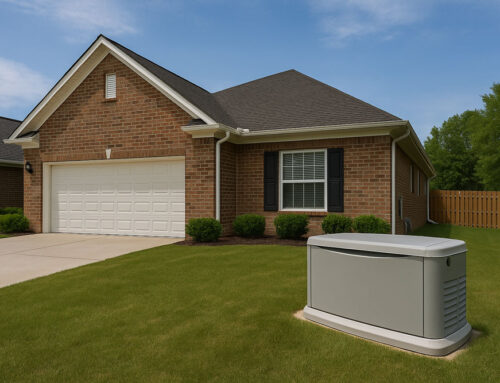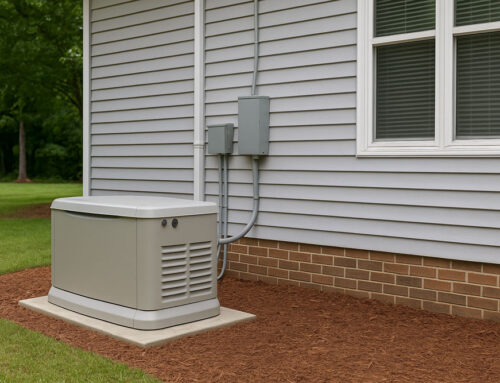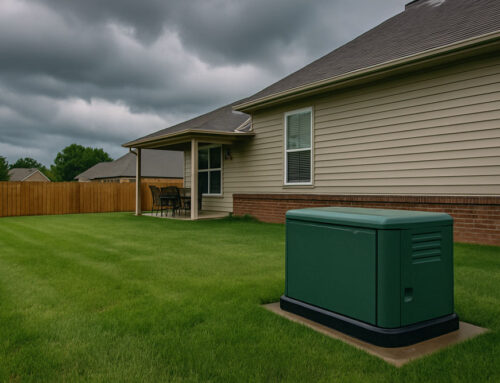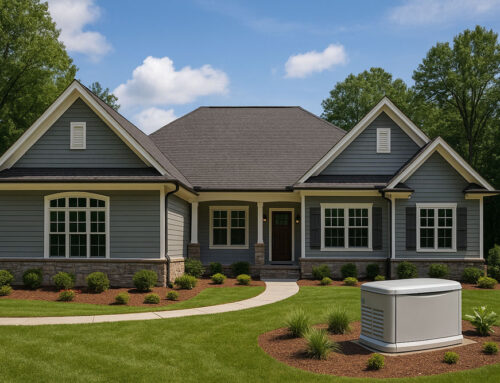Generators have become essential in storm-prone areas like coastal North Carolina—but there’s still a lot of misinformation out there. From how they work to how they’re installed, we’ve heard it all. These myths often lead to poor decisions, unnecessary expenses, or unsafe setups. Let’s set the record straight on some of the most common generator myths.

Myth #1: Portable generators are just as good as standby systems.
This is one of the most common misconceptions we hear. While portable generators can keep a few appliances running during a short-term outage, they don’t come close to matching the convenience, capacity, or safety of a standby system. A whole-home generator activates automatically, supports critical systems like HVAC, sump pumps, and security, and doesn’t require fuel juggling or outdoor setup in a storm.
Myth #2: I don’t need a generator unless I lose power often.
Even one extended outage can result in thousands of dollars in food loss, flooded basements, or emergency hotel stays. Generators are like insurance: they protect your home and family from rare but highly disruptive events. Waiting until outages become routine only increases stress and risk.
Myth #3: Generators are loud and ugly.
Modern standby generators are much quieter than older models. Many systems operate at around 60 decibels—about the same as a normal conversation. And with compact, neutral-toned enclosures, they blend in with landscaping and home exteriors far more effectively than most people expect.
Myth #4: Generators are only for large homes.
Not true. We install systems of all sizes—ranging from essential circuit coverage in small homes to full-home backup in larger properties. Our team customizes the solution based on your energy use, budget, and lifestyle, not the size of your house.
Myth #5: It’s cheaper to install a generator myself.
DIY generator installations are risky, often illegal, and in many cases void the warranty. They can also lead to backfeeding, fire hazards, and insurance issues. Our licensed team ensures all work is up to code, permitted properly, and tested for safety. When it comes to electrical systems, shortcuts aren’t worth the risk.
Myth #6: Natural gas or propane isn’t reliable during storms.
Unlike gasoline, natural gas and propane are stored or piped in systems that aren’t disrupted by downed power lines. In fact, these fuels are preferred in emergency systems because they’re stable, long-lasting, and don’t degrade. We help homeowners choose the right fuel type based on access and supply availability.
Myth #7: Generators require constant maintenance.
Modern standby systems are designed for low-maintenance operation. With routine professional servicing—usually twice a year—your generator remains in top condition. We handle that for our clients, including oil changes, diagnostics, battery tests, and firmware updates.
Myth #8: You have to choose between comfort and affordability.
There are many generator sizes and configurations. We help homeowners prioritize what needs power most and design a system that fits both their needs and budget. It’s not all or nothing—smart load management and selective circuit coverage offer flexible solutions.
Myth #9: You can’t use generators with smart home tech.
Today’s generators integrate seamlessly with smart panels, energy monitors, and app-based alerts. You can even get notifications if there’s a fault or service is needed. These features make managing your backup power easier and more transparent than ever before.
Generators don’t have to be complicated, noisy, or oversized. They just have to be done right—and that starts with separating fact from fiction.
Contact Powerhound at (910) 296-3536 or visit our Facebook page to get expert answers to your questions and a backup power plan that makes sense.
#GeneratorMyths #HomeBackupPower #PowerhoundTruth





